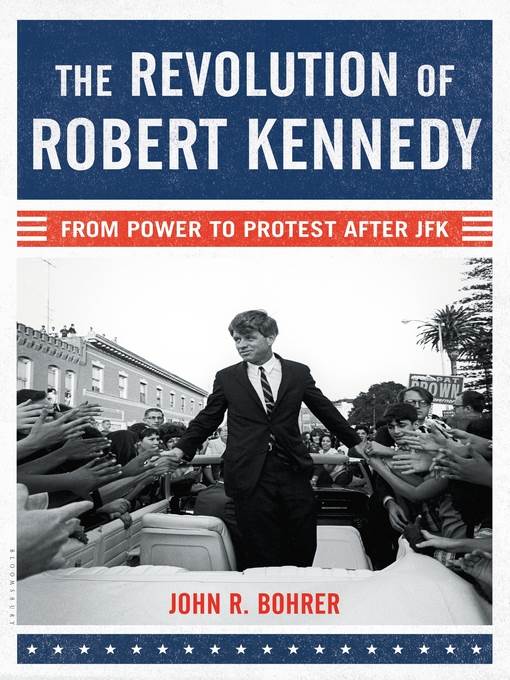
The Revolution of Robert Kennedy
From Power to Protest After JFK
کتاب های مرتبط
- اطلاعات
- نقد و بررسی
- دیدگاه کاربران
نقد و بررسی

May 15, 2017
On streets and college campuses from New York to Mississippi, as well as Latin America and South Africa, huge crowds gathered for Robert Francis "Bobby" Kennedy (1925-68), younger brother of U.S. President John F. Kennedy. Originally, they cheered Bobby as the personification of John's progressive legacy. Eventually, they lauded him for his own achievements. As a federal prosecutor, attorney general, senator, and Democratic presidential candidate, he advocated peace in Vietnam and spoke against regime change and apartheid. Rivals branded him a ruthless opportunist who leveraged the Kennedy name to electoral success. From independent journalist Bohrer, this biography focuses on the turbulent period 1963-66, when Bobby grieved the loss of his brother and forged his own political path. Later chapters concentrate on politics and Bobby's troubled relationship with President Lyndon B. Johnson. While Larry Tye's Bobby Kennedy and Arthur Schlesinger Jr.'s Robert Kennedy and His Times boast more distinguished pedigrees and longer page counts, this work makes its mark. VERDICT Although Kennedy was not quite as revolutionary as the title implies, Bohrer's elegiac and exhaustive account reveals a potentially transformational leader whose life was dramatically cut short by his assassination in 1968.--Michael Rodriguez, Univ. of Connecticut
Copyright 2017 Library Journal, LLC Used with permission.

April 24, 2017
Bohrer, a reporter, historian, and television news producer, follows the arc of Bobby Kennedy’s political career from November 1963, the month of J.F.K.’s assassination, to R.F.K.’s own assassination in June 1968. J.F.K.’s death marked the emergence of R.F.K. as an independent politician whose stature and influence grew—within the Democratic Party, with anti-Vietnam activists, and with progressives—significantly over this five-year span. Bohrer first concentrates on R.F.K.’s fraught relationship with President Johnson, which was complicated by both the public’s desire to see R.F.K. as an extension of his brother and Johnson’s uneasiness with the specter of his predecessor. Bohrer then turns to his core thesis: that R.F.K.’s political philosophy evolved to embrace a revolutionary domestic policy that focused on relieving poverty in rural as well as urban America and a desire to address racial injustice. R.F.K. also proposed an equally novel foreign policy that eschewed direct interference in Latin America, featured opposition to South African apartheid, argued for a negotiated peace with North Vietnam, and favored nuclear nonproliferation. Readers will see the issues R.F.K. raised in his fight for the 1968 Democratic presidential nomination echoed in early 21st-century American politics. Well-written and well-documented, Bohrer’s work paints a picture of R.F.K. that is favorable, but not hagiographic.

May 1, 2017
Freelance reporter and TV news producer Bohrer debuts with an inquiry into the transformation of Robert F. Kennedy (1925-1968) from hard-nosed political operative to inspirational presidential candidate.When John F. Kennedy was murdered in 1963, his brother Robert had never held elective office, nor seemed likely to. As JFK's campaign manager and later as attorney general, he stepped on many toes and made few friends; the word most often used to describe him was "ruthless." Grief-stricken and increasingly marginalized by a paranoid Lyndon Johnson, RFK was profoundly uncertain about his future. After a desultory quest for the 1964 vice-presidential nomination was vetoed by Johnson, he won a Senate seat in New York and began building a national constituency around a radical social welfare program and skepticism about the administration's Vietnam policy. Growing up in wealth and privilege, he had had little experience with the effects of racism and poverty; as a senator, his efforts to advance his brother's civil rights legacy led him to a wholehearted embrace of their victims in contentious and even dangerous circumstances. To young people, especially, he began speaking passionately of a "revolution now in progress," peaceful if possible, but demanding advances in individual dignity and in economic and political freedom. Bohrer presents this thorough and well-researched narrative in an evenhanded style, leaving evaluation of this still-controversial politician to readers. Oddly, he ends his story in early 1966, two years before RFK definitively broke with Johnson, running a long-shot presidential campaign that ended with Kennedy's assassination; the implication is that Kennedy's political transformation was complete by this time and all that followed was merely consequential. The author also leaves it to readers to ponder the continuing relevance of this long-dead senator who stood for many as "a bridge for a country that was tearing apart." A poignant sketch of a lost champion of social justice from an age when it could still be said that "politics is still the greatest and most honorable adventure."
COPYRIGHT(2017) Kirkus Reviews, ALL RIGHTS RESERVED.

























دیدگاه کاربران